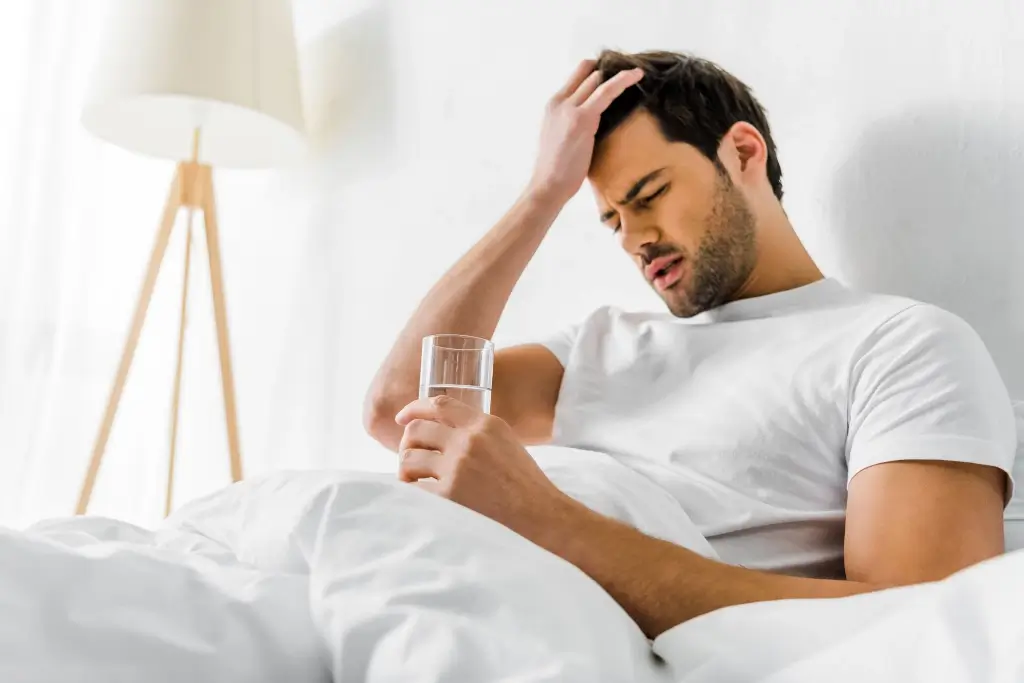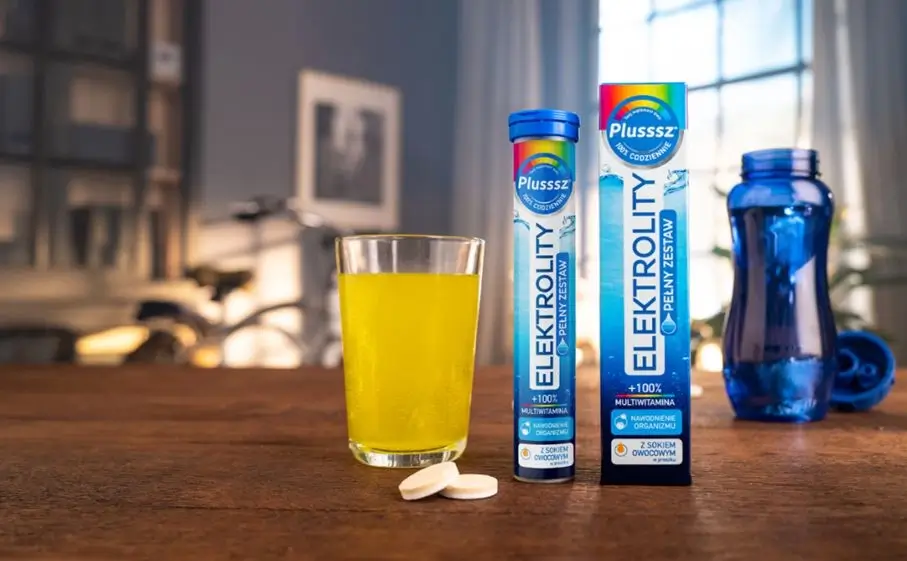Feeling unwell and experiencing hangover symptoms after consuming alcohol are unpleasant but physiological reactions of the body as it metabolizes the alcohol and tries to return to its natural balance. Depending on gender, age, the amount of alcohol consumed, and the body’s ability to process it and recover, a hangover can last from several hours to even a full day after the last drink.
Alcohol, regardless of the amount consumed, has a harmful effect on the body. A person who wants to lead a healthy, balanced lifestyle should completely eliminate alcoholic beverages. There is a common belief that certain types of alcohol, such as wine or beer, have beneficial effects on the body. We debunk this myth. While it’s true that these beverages contain compounds that may have a positive impact—such as polyphenols and antioxidants—the presence of alcohol always negatively affects the body. There is no safe dose of alcohol that is recommended for consumption.

Of course, the situation described above is an ideal scenario and rarely happens in real life. Drinking alcohol on certain occasions has become deeply ingrained in culture. So how can we deal with the unpleasant symptoms of a hangover when the amount of alcohol consumed is already out of our control and, as the saying goes, “the milk has been spilled”? How can we quickly recover? Is it possible to prevent a hangover while drinking alcohol? Are there vitamins and minerals worth taking after alcohol consumption? You’ll find answers to these and other questions in the article below—read on.
Hangover – Definition
To understand the physiological causes behind feeling unwell after a heavy night of drinking, it’s important to first define what a hangover is.
A hangover is a deterioration of both physical and mental well-being. This condition arises the day after a single episode of consuming too much alcohol. Hangover symptoms typically begin to appear as the blood alcohol concentration starts to fall (as the body metabolizes and eliminates alcohol from its tissues) or when it approaches zero. Contrary to popular belief, a hangover does not only occur after drinking strong alcohol—it can also happen after drinking beverages considered weaker, such as wine, beer, or alcoholic cocktails.
The first signs of feeling unwell usually appear in the morning after a night’s sleep. A hangover can last from a few hours to even 24 hours after drinking ends. The duration of symptoms depends on several factors, including:
- Body weight in relation to the amount of alcohol consumed (measured in units);
- Gender;
- Overall hydration level and concentration of vitamins and minerals in the body;
- General condition of the body’s excretory and metabolic systems (such as the liver and kidneys).
What are the symptoms of a hangover? The intensity of physical and emotional discomfort also depends on several factors, including how much alcohol was consumed. Most commonly, a hangover presents with a very recognizable set of symptoms, and when combined with the knowledge that alcohol was consumed the day before, it usually rules out other possible causes of feeling unwell.

Among the symptoms of a hangover, we can list the following:
- Fatigue, malaise, low mood – this is a typical, most common symptom that may (though not always, in milder cases) trigger other hangover symptoms;
- Thirst accompanied by dry mouth, dry skin, and a noticeably decreased level of hydration in the body;
- Loss of appetite, digestive discomfort;
- Sleep disturbances, trouble falling asleep or, on the contrary, overwhelming drowsiness that is hard to fight off;
- Attention and concentration problems, difficulty focusing, inability to perform everyday tasks;
- Memory issues.
Why Does Your Head Hurt After a Boozy Party? Physiological Causes of a Hangover
There are many causes of a hangover and the symptoms experienced while sobering up. Alcohol has multiple negative effects on the body. A hangover occurs because:
- Alcohol directly affects the brain and other organs and systems in the body in a harmful way;
- During the breakdown (metabolism) of alcohol, compounds are produced that negatively affect the body;
- Alcohol consumption often leads to other unhealthy behaviors that also impact how you feel the next day, such as smoking, eating heavy or processed foods, lack of sleep, etc.
How is alcohol metabolized? The portion of alcohol consumed is converted into acetaldehyde in the liver. It is this substance that is responsible for most of the unpleasant symptoms experienced the day after drinking. In some people, the process of breaking down alcohol into metabolic byproducts happens faster, while in others it is slower and less efficient. People who metabolize it faster often show signs like flushed face and hands and increased sweating shortly after drinking a glass of vodka or wine—this is due to increased blood circulation and elevated blood pressure.
It is believed that the longer and heavier the drinking session, the higher the chance of experiencing symptoms like mood deterioration and feeling unwell, commonly referred to as a hangover.
As previously mentioned, alcohol negatively affects organs and tissues in the body. The direct effects of consuming several or more servings of alcohol include:
- Electrolyte imbalance and decreased tissue hydration
Water is essential for the physiological functioning of the body. When drinking alcohol, it inhibits the action of vasopressin—a hormone responsible for retaining water in the body at the kidney filtration level. When vasopressin is suppressed, excessive urination and sweating occur. With urine and sweat, we lose water and electrolytes—ions of elements responsible for water metabolism and for conducting electrical impulses between nerve cells.
- Digestive system disturbances, gastrointestinal discomfort
The cause is simple. Alcohol is an irritating substance. When it reaches the stomach and intestines, it irritates the lining tissues, which leads to increased production of stomach acid, pancreatic enzymes, and intestinal enzymes. This is what causes many people to feel nausea and abdominal discomfort during a hangover.
- Decreased blood glucose levels
Usually, blood sugar levels do not drop immediately. A single occasion of heavy drinking typically doesn’t cause this. However, after several days of drinking, blood glucose levels may fall. Since glucose is the main fuel and energy source for the brain, a drop in its concentration can result in fatigue, tiredness, and problems with concentration.
- Sleep disturbances, problems with the biological clock, and natural sleep-wake rhythm
Alcohol consumption often results in drowsiness. However, sleep that follows significant alcohol intake is of much poorer quality than natural sleep. If you consume alcohol in the evening or at night (which is typical due to its social role), it can disrupt your sleep rhythm. This doesn’t necessarily stem from alcohol’s direct effect on the body but rather from the drinking context.
How to Reduce the Risk of Feeling Unwell?
First, it should be noted that alcohol consumption always leads to negative changes in the body. Alcohol is classified as an irritating compound with a degenerative effect on proteins. We recommend reducing the intake of alcoholic beverages—and ultimately eliminating them.
While drinking alcohol, it is possible to reduce the risk of experiencing the “next day syndrome” in the morning. How? Make sure to hydrate regularly by drinking water or juice alongside your alcohol, and avoid sugary and carbonated drinks.
If you enjoy tomato juice, consider sipping alcohol with it. It’s excellent for hydrating the body and provides additional vitamins and minerals, including electrolytes like sodium and potassium, which are essential for fluid balance.
Are There Ways to Speed Up Recovery After a Hangover?
Unfortunately, the only real remedy for a hangover is time. However, some methods can help ease the symptoms and improve your overall well-being on the day after drinking. What are they?
- Rehydration – drink plenty of fluids. Water is essential, but you can also reach for electrolyte supplements in the form of effervescent tablets or ready-to-drink solutions. They not only hydrate your body but also replenish important minerals such as sodium, potassium, and magnesium, which were lost during alcohol consumption.
- Light, easily digestible meals – if you’re experiencing nausea or stomach discomfort, start your day with something light: toast, banana, soup, or oatmeal. Avoid greasy, heavy foods which can burden your digestive system even more.
- Sleep and rest – if possible, give your body time to regenerate. A short nap or simply a day of taking it easy can make a significant difference in how quickly your body returns to balance.
- Fresh air and light physical activity – a walk or some gentle movement can help improve blood circulation, oxygenate the brain, and clear your head, even if you’re still feeling the effects of the hangover.
If you’re considering supplements, choose those that provide not only electrolytes but also vitamins that support nervous system function and energy metabolism – such as vitamin C, B vitamins (especially B1, B6, B12), and folic acid.
Summary
Hangover symptoms are the result of many complex processes triggered in the body after alcohol consumption. While the best solution is to avoid drinking altogether, there are steps you can take both during and after drinking to reduce the severity of symptoms.
Hydration is key – especially with water and electrolytes. Maintaining a balanced diet, taking breaks to rest, and supporting your body with vitamin and mineral supplements can help you get back on track faster and lessen the effects of the “day after.”

Drink responsibly, allowing time between each serving of alcohol. By spacing out your drinks, you reduce the risk of becoming intoxicated and unintentionally exceeding the amount of vodka or wine you originally planned to consume.
While drinking, watch your diet and avoid heavy meals and overeating. Fatty, fried foods won’t protect you from discomfort and fatigue the next day. On the contrary, they may worsen your condition and, for example, cause nausea. Also read: Spring fatigue – how to support your body at the turn of winter and spring?
Take Care of Your Body Every Day – Diet and Exercise
A properly hydrated and nourished body will, in most cases, metabolize alcohol more efficiently. The effects of drinking will be milder and easier to handle. Take care of your diet every day. Remember that the foundation of a healthy lifestyle is physical activity and adequate fluid intake.
A properly balanced diet should include complex carbohydrates. You’ll find them in whole grain bread, pasta, groats, and rice. Add vegetables to your meals. You should eat 5 servings of vegetables per day. What does that mean? That every meal should include vegetables. We usually eat too few vegetables or replace them with fruits, which is incorrect. Fruits can be a great snack or a colorful addition to your plate that encourages eating and makes the meal more enjoyable.
Red and blue fruits (such as raspberries, blueberries, currants, etc.) are rich in antioxidants and polyphenols – compounds that have a protective effect on the body’s tissues and organs. Other types of fruits (apples, grapes, pears, watermelon, bananas) mainly provide vitamins and minerals. Proper intake of these nutrients can help prevent episodes of feeling unwell – even after consuming excessive amounts of alcohol.
Supplement your diet with high-quality protein, choosing meats and fish from certified farms. Avoid meat with visible fat. Opt for lean types – chicken, turkey, rabbit, or beef (note that beef should not be consumed more than 1–2 times a week).
On a daily basis and before an event where you plan to drink alcohol, magnesium will come in handy. Where can you find it? In nuts, almonds, and cocoa.

Sure! Here’s the translated text with formatting preserved:
—
Hangover Remedies
Alcohol has been a part of Western and other cultures for a very long time. Traditionally, it accompanies the celebration of important events and has historically played a significant role in rituals and ceremonies, such as those marking seasonal changes. Despite its long presence in human history, no effective, scientifically proven cure or miracle antidote has been found to completely eliminate the unpleasant symptoms of fatigue, exhaustion, and discomfort that follow alcohol consumption.
If you overdo it with alcohol the night before, there are still a few remedies you can try to help ease the effects and get through the day feeling a bit better.
- Relieving a headache
Headache and sensitivity to light are among the most persistent symptoms of a hangover. You can ease them using simple home remedies. First and foremost, it’s recommended to rest in a dark, quiet, and cool room. A high ambient temperature can worsen your condition.
Apply a cold compress to your head. You can make one yourself using a towel soaked in cold water or use a ready-made cold pack from the pharmacy. If those options aren’t convenient for you, cooling gel patches are also a great choice.
- Replenishing fluids and restoring proper hydration
While drinking alcohol, your body’s electrolyte balance was disrupted. Many hangover symptoms are linked to this imbalance. Rehydrate with non-alcoholic beverages only. The best sources of fluids and electrolytes are water and fruit-vegetable juices. If you have an appetite, drinking a few cups of broth or vegetable stock can also help. It not only hydrates you but also provides essential electrolytes like sodium and potassium.
If you’re not in the mood for juice and find water unappealing, try a ready-to-use electrolyte supplement in the form of effervescent tablets dissolved in water, or a product enriched with vitamins and minerals. These kinds of supplements usually have a refreshing fruity taste and come in a convenient form. Simply dissolve the tablet in cool water and drink. Vitamin supplements are especially helpful for people who struggle to eat and replenish nutrients like vitamin C, potassium, or calcium through food. Not sure which product to choose? The Plusssz Elektrolity + 100% Multivitamin dietary supplement combines all the benefits of effervescent tablets dissolved in water with electrolytes: a comprehensive formula and delicious fruity flavor. Thanks to its convenient format, you can always have it on hand and use it whenever you feel you need an extra hydration boost.

- Try to replenish blood glucose levels
Drinking alcohol leads to a drop in blood sugar (glucose) levels. To restore it, eat a small, easily digestible meal. Reach for a piece of bread, crackers, or toast. If you have an appetite, eat a meal that includes fruit – this will also help replenish lost vitamins and electrolytes.
- Give yourself time to rest
You need sleep and time to recover. Sleep longer than usual, especially if drinking alcohol was associated with a sleepless night and a late return home. Fatigue is not only the result of low mineral levels but also from lack of sleep and an intense social day before.
If you don’t need to go to work the next day, take the day off – you’ll recover faster, and the discomfort from fatigue won’t follow you for the rest of the week.
Vitamins and minerals that help after alcohol consumption
Hangover symptoms also indicate an increased need for vitamins and minerals. Below we’ve listed some key nutrients your body may need especially at this time.
| Nutrient | Benefits |
| Magnesium | · Helps reduce tiredness and fatigue; · supports electrolyte balance; · contributes to normal energy-yielding metabolism; · supports the proper functioning of the nervous system; · aids normal muscle function; · supports normal protein synthesis; · contributes to normal psychological function; · helps maintain healthy bones and teeth; · plays a role in cell division. |
| Potassium | · Supports the proper functioning of the nervous system; · aids normal muscle function; · helps maintain normal blood pressure. |
| Vitamin C | · Supports normal energy-yielding metabolism; · helps the nervous system function properly; · contributes to normal psychological function; · helps reduce tiredness and fatigue. |
| Iron | · Helps reduce tiredness and fatigue; · supports normal oxygen transport in the body; · aids cognitive function. |
Tab. 1. Properties of selected vitamins and minerals.
Questions and answers about hangover remedies
Can digestion and alcohol breakdown be sped up? I want to sober up as quickly as possible.
There is a common belief in media and society that physical activity or certain dietary components (like fats) can speed up alcohol breakdown. This is not true. The rate of alcohol metabolism depends on many factors, mostly individual, and there is no method to speed up how quickly alcohol is eliminated from the bloodstream.
Physical exercise or specific foods do not affect how quickly your blood alcohol level drops to zero.
Currently, there is no scientifically proven method that effectively prevents or treats a hangover. We also urge caution – don’t trust internet myths, as they are not always safe.

Sure! Here’s the translated version with formatting preserved:
—
To improve your well-being, we recommend rest and proper hydration. Replenishing the electrolytes lost through urine and sweat may also help reduce the feeling of fatigue after consuming an excessive amount of alcoholic beverages, but it will not affect the sobering-up process. If you have any doubts about your condition, refrain from driving or performing tasks that require sobriety, concentration, quick reactions, and attention.
How to check if your blood alcohol level has dropped to zero?
Unfortunately, aside from measuring the alcohol content in exhaled air or taking a laboratory test from a blood sample, there is no reliable method that can give you certainty that the alcohol consumed the previous day has been fully metabolized and eliminated from your system.
Remember that even if all the alcohol has been metabolized, you may still experience unpleasant hangover symptoms — fatigue, boredom, and difficulty with concentration and attention. Refrain from driving, and if possible, take the day off work, as during a hangover you may pose a danger to yourself and others — this advice is especially important for people whose job involves operating heavy machinery, but everyone should give themselves time to rest, relax, and return to balance.
Can eating certain foods while drinking alcohol protect me from a hangover?
As with methods for dealing with the “day-after syndrome,” there is no scientific evidence that eating, for example, animal fats prevents symptoms of weakness and reduced well-being the next day after drinking.
Of course, a properly nourished body may cope better with a hangover. People who normally stay well-hydrated are also less likely to feel the effects of dehydration after alcohol consumption.
Eating fast food, heavy, fried, and greasy meals may actually worsen your condition the next day, as alcohol intensifies gastrointestinal discomfort. Choose light snacks and avoid overeating — this will help you feel better the following day.
Summary
A hangover is a physiological reaction of the body to the consumption of excessive amounts of alcohol. There are no scientifically proven and confirmed methods for dealing with a hangover. However, rest, hydration, and replenishment of essential minerals and vitamins can help manage its symptoms.
